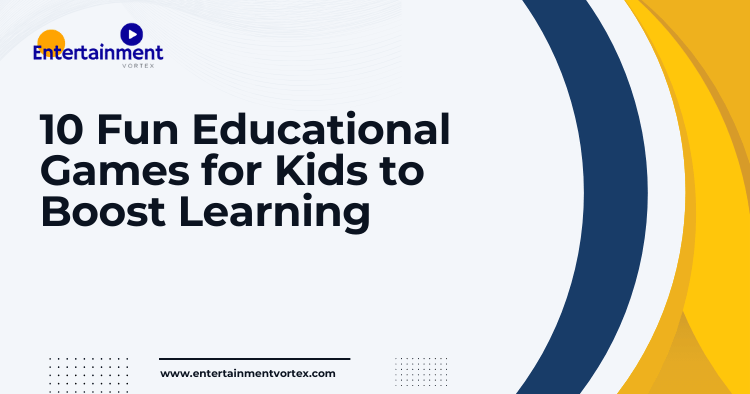Table of Contents
- Introduction
- 1. Scrabble
- 2. Math Bingo
- 3. Minecraft: Education Edition
- 4. Kahoot!
- 5. The Game of Life
- 6. Pictionary
- 7. Simon Says
- 8. Story Cubes
- 9. BrainPop
- 10. Duolingo
- FAQs
- Conclusion
Introduction
In an age where technology and interactive learning are at the forefront of education, finding ways to make learning enjoyable is essential. Educational games can bridge the gap between fun and learning, offering kids engaging ways to develop critical skills. In this article, we’ll explore 10 fun educational games that not only entertain but also boost learning in various subjects.
1. Scrabble
Scrabble is a classic board game that challenges players to create words from individual letter tiles. This game promotes vocabulary development, spelling skills, and strategic thinking. Kids can play with family or friends, allowing for social interaction while learning.
Benefits:
- Enhances vocabulary and spelling.
- Encourages strategic thinking and planning.
- Can be played in various languages, making it versatile.
For more information on Scrabble, visit the official Scrabble website.
2. Math Bingo
Math Bingo combines the excitement of bingo with math problems. Each player has a bingo card filled with answers to math equations. The caller announces math problems, and players must solve them to find the corresponding answer on their card.
Benefits:
- Reinforces math skills in a fun way.
- Improves quick thinking and problem-solving.
- Can be customized for various math levels.
Example Bingo Card:
| 2 | 4 | 6 | 8 | 10 |
| 3 | 5 | 7 | 9 | 12 |
| 1 | 11 | 13 | 15 | 16 |
| 14 | 18 | 20 | 17 | 19 |
| 22 | 21 | 24 | 23 | 25 |
3. Minecraft: Education Edition
Minecraft: Education Edition is a game that combines creativity with educational elements. It allows kids to explore and build in a virtual world while learning subjects like math, science, and history.
Benefits:
- Encourages creativity and teamwork.
- Teaches problem-solving and resource management.
- Supports a variety of subjects through different learning modules.
Discover more about Minecraft: Education Edition on the official website.
4. Kahoot!
Kahoot! is a game-based learning platform that allows teachers and parents to create quizzes on various subjects. Players can join using their devices and compete in real-time, making it a fun way to learn new concepts.
Benefits:
- Engages students through friendly competition.
- Can cover a wide range of topics.
- Simple to use and accessible for all ages.
Learn how to create your own quizzes at Kahoot!.
5. The Game of Life
The Game of Life simulates a person’s journey through life, including education, career choices, and family. Players navigate through events that teach valuable life lessons about finances and decision-making.
Benefits:
- Teaches financial literacy and planning.
- Encourages critical thinking about choices and consequences.
- Promotes discussions about real-life scenarios.
Explore more about The Game of Life here.
6. Pictionary
Pictionary is a drawing and guessing game that enhances creativity while improving vocabulary and communication skills. Players take turns drawing prompts, while others guess what they are.
Benefits:
- Encourages artistic expression.
- Boosts vocabulary and team collaboration.
- Suitable for all ages and adaptable to various themes.
For tips on how to play Pictionary, check out Pictionary’s official page.
7. Simon Says
Simon Says is a classic game that helps children improve listening skills and following directions. One player (Simon) gives commands, and players must only follow them if prefixed with “Simon says.”
Benefits:
- Develops listening skills.
- Encourages physical activity and coordination.
- Can be played anywhere without any materials.
“Listening is a skill that enhances learning in all areas. Simon Says makes it fun!”
8. Story Cubes
Story Cubes are dice with various images that inspire storytelling. Players roll the cubes and create a narrative based on the images shown, promoting creativity and language skills.
Benefits:
- Enhances creativity and storytelling abilities.
- Encourages cooperative play and imagination.
- Can be used for writing prompts in classrooms.
Find out more about Story Cubes here.
9. BrainPop
BrainPop is an online educational platform featuring animated videos and quizzes on a wide range of subjects. It makes learning interactive and fun, catering to different learning styles.
Benefits:
- Covers numerous subjects with engaging content.
- Offers assessments to track progress.
- Provides resources for teachers and parents.
Explore BrainPop at brainpop.com.
10. Duolingo
Duolingo is a language-learning app that gamifies the process of learning new languages. Through interactive exercises and challenges, kids can learn vocabulary and grammar in a fun and engaging way.
Benefits:
- Encourages daily practice with rewards.
- Offers a variety of languages to choose from.
- Suitable for all ages and skill levels.
Learn more about Duolingo at duolingo.com.
Also Look For
If you’re interested in incorporating creative projects into your educational activities, check out 10 Easy DIY Projects for Beginners to Spark Creativity. These projects can serve as excellent hands-on learning experiences that complement the educational games discussed above.
FAQs
1. Are educational games effective for learning?
Yes! Educational games engage children in active learning, making it easier for them to absorb new concepts while having fun.
2. How can I incorporate educational games at home?
You can set aside time for family game nights, use online platforms, or create your own games based on your child’s interests and learning needs.
3. What age group are these games suitable for?
Most of these games can be adapted for various age groups, from preschoolers to tweens, ensuring all kids can have fun while learning.
4. Are there free educational games available?
Absolutely! Many online platforms, including Kahoot! and Duolingo, offer free access to their educational games and resources.
Conclusion
Incorporating educational games into your child’s routine can significantly enhance their learning experience while keeping them engaged and entertained. From classic board games like Scrabble to interactive platforms like Kahoot!, there are countless options to explore. So gather the family, pick a game, and watch your child’s learning flourish in a fun and exciting way!
For additional family activities, consider 10 Fun Indoor Activities for Rainy Days with Family as a great complement to your learning games.






